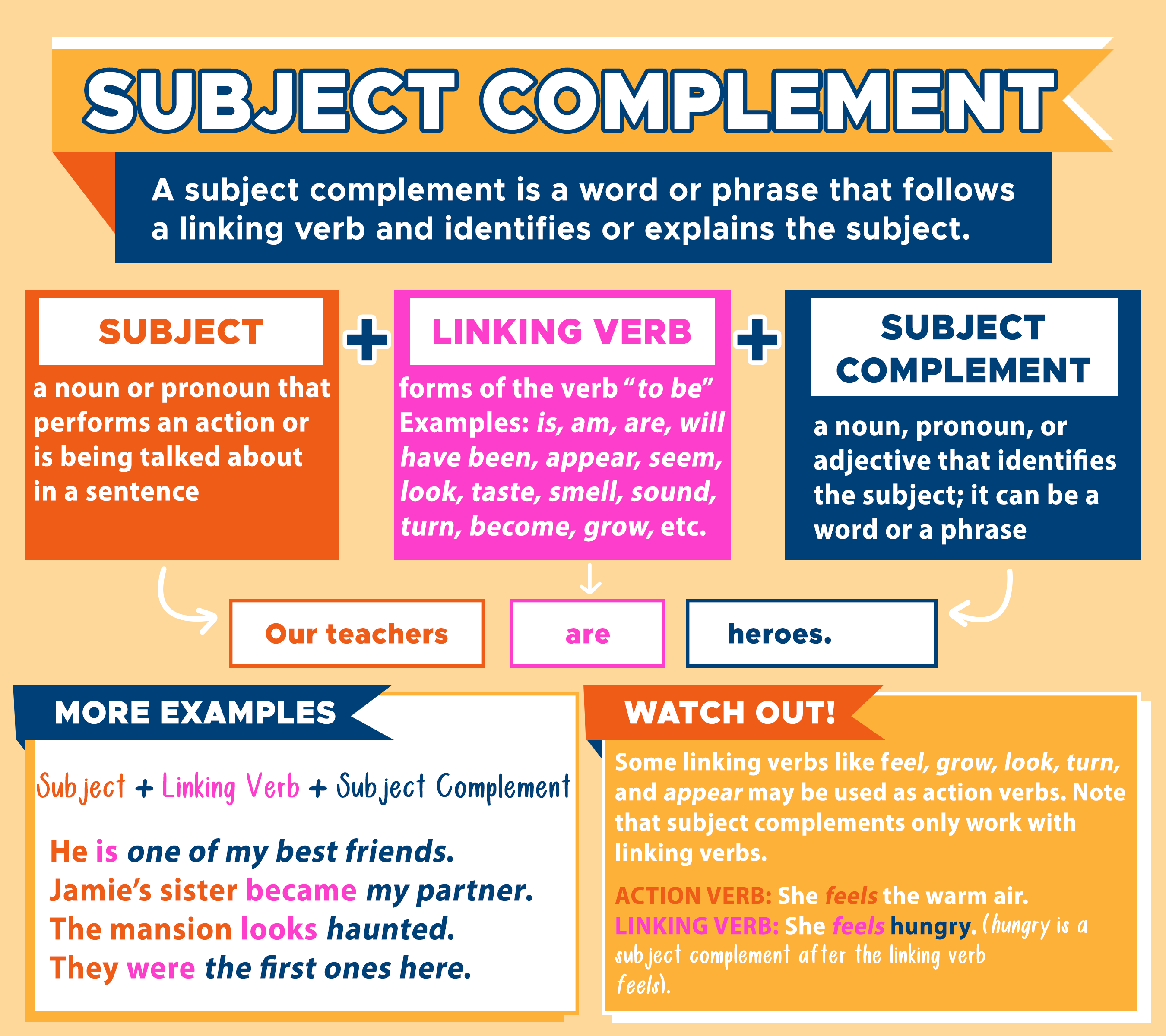What is a Linking Verb?
A linking verb connects the subject to a word in the predicate. Because linking verbs do not express an action, they also don’t require a direct or indirect object.
Related Reading: Direct and Indirect Objects: Pair with Verbs
Here are the most popular linking verbs: am, is, are, was, were, be, being, been. All forms of the verb be are linking verbs, such as: shall be, will be, can be, might be, would have been, has been, etc.
- Monty is an engineer. [Monty = an engineer]
- Mara seems nice. [Mara = nice]
- They will be okay. [They = okay]
Here are other verbs often used as linking verbs: seem, appear, remain, look, smell, taste, feel, sound, stay, and become. Remember that some of these verbs can also be action verbs. In the sentence “Celine feels pain,” the verb is transitive and pain is its direct object.
Instead of direct and indirect objects, linking verbs work with subject complements, which we’ll discuss next.
Subject Complement: Word(s) Following Linking Verbs
A subject complement is a word or group of words that follow a linking verb and identifies or explains the subject. Keep in mind that subject complements always refer to the subject. In the sentence “Monty is an engineer,” the linking verb is connects the subject Monty to the subject complement an engineer which explains something about Monty.
Nouns, pronouns, and adjectives can be a subject complement whether as a single word or as a phrase. A noun or pronoun that functions as a subject complement is also called a predicate nominative, while an adjective that acts as a subject complement is called a predicate adjective.
Subject Complements in a Sentence
Here are examples of sentences with the subject complements in bold, subjects italicized, and linking verbs listed out.
- Rachel is ditzy.
Linking verb: is
[The adjective ditzy is a subject complement modifying the subject Rachel. They’re connected by the linking verb is.] - She seems very intelligent.
Linking verb: seems - It was her car I saw last night.
Linking verb: was - They were the ones who stole the money.
Linking verb: were - Life would be extremely difficult and dark without you.
Linking verb: would be - Without anyone knowing why, the movie became a hit.
Linking verb: became - Do you agree that Stanley Kubrick is an overrated director?
Linking verb: is - She is the faithful who claims that nothing is impossible to those who believe.
Linking verb: is
[The subject complement the faithful modifies the subject she; The subject complement impossible modifies the subject nothing.]

Don’t confuse a subject complement with an object. Remember that subject complements rename or explain the subject, while verb complements (direct and indirect objects) complete the verb.
Subject Complement: Krizzia is a big-hearted lady.
[The subject complement a big hearted identifies the subject Krizzia.]
Verb Complement: Krizzia bought a big-hearted lady some gifts.
[The indirect object a big-hearted lady tells for whom Krizzia bought some gifts (direct object).]
NOTE: Prepositional phrases can also serve as subject complements.
Prepositional phrases (in bold) as subject complements:
- Sometimes, your thoughts are beyond this world.
Linking verb: are - The message is of the utmost importance.
Linking verb: is - She looks out of her mind.
Linking verb: looks
Practice Identifying Linking Verbs & Subject Complements:
Identify the subject, its subject complement, and the linking verb in each sentence. Once identified, bolden the subject complement and italicize the subject. List out the linking verbs as before.
- Our teacher is also a volunteer firefighter.
- The place feels unwelcoming and eerie.
- Why did he become aloof?
- His favorite student has always been her.
- The past went forgotten.
Answers:
- Our teacher is a volunteer firefighter at night.
Linking verb: is - The place feels unwelcoming and eerie.
Linking verb: feels - He suddenly became aloof without explanation.
Linking verb: became - His favorite student has always been Andy.
Linking verb: has (always) been - The past went forgotten.
Linking verb: went
Thank you for reading. We hope it’s effective! Always feel free to revisit this page if you ever have any questions about linking verbs and subject complements.

